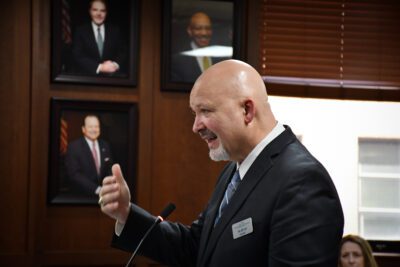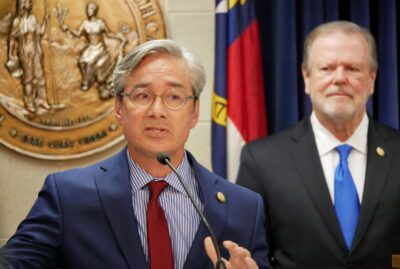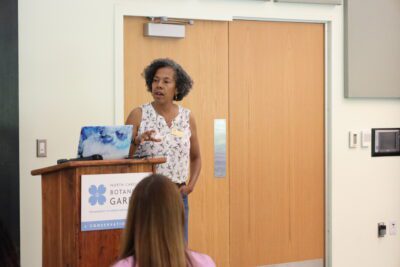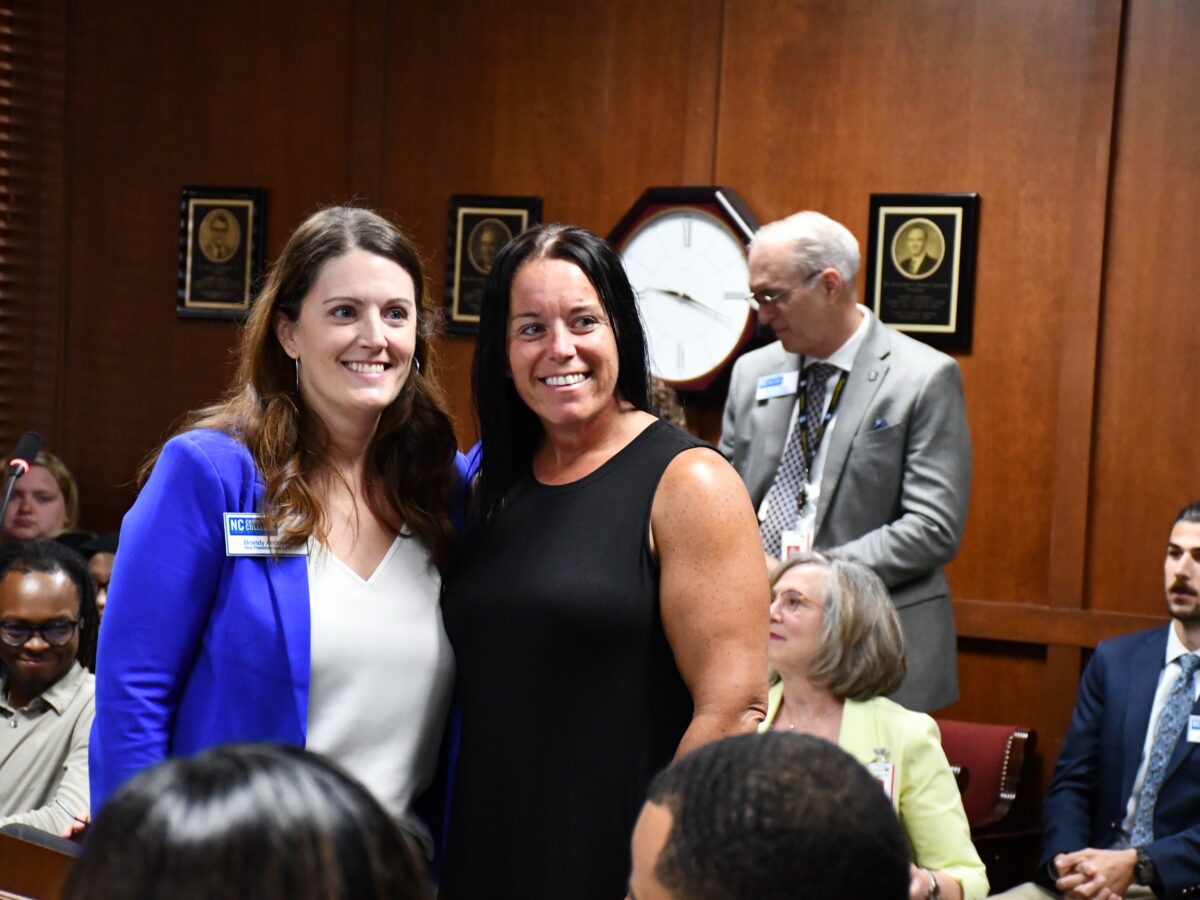
Share this story
- Personnel transitions, grants, and teacher shortage were among some of the topics discussed during this month's State Board of Community Colleges' meeting. Read the recap here.
- In her final report to the Board, NC4SGA president and Board student representative, LaTasha Bradford, shared her experiences of serving on the Board and the importance of student voices. You can read her comments and more here.
|
|
This month’s State Board of Community Colleges meeting heralded several transitions that will play out in the coming months.
Dr. Laura Leatherwood, president of Blue Ridge Community College, delivered her first report to the Board as president of the North Carolina Association of Community College Presidents (NCACCP). Leatherwood succeeds Dr. Jeff Cox, who will begin his role as the system president starting June 1, 2023.
Leatherwood’s report included reflections about the success of the state’s community colleges, paying special attention to this month’s graduates. On average, the North Carolina Community College System (NCCCS) credentials more than 50,000 students each year.
“These students represent nurses, nurse aides, law enforcement officers, firefighters, welders, accountants, business professionals, social workers, paramedics, electrical linemen, machinists, engineers, plumbers, electricians, masons, truck drivers, biotech technicians, and the list goes on,” Leatherwood said.
LaTasha Bradford, president of N4CSGA and, in turn, the Board student representative, took a moment during her final report to the Board to express her gratitude for having served alongside them.
“This experience is really invaluable. And I hope this experience remains for future students because you cannot get these types of lessons anywhere else,” Bradford said. “From leadership to relationship building to fortitude to perseverance – this is a great training ground for any student.”
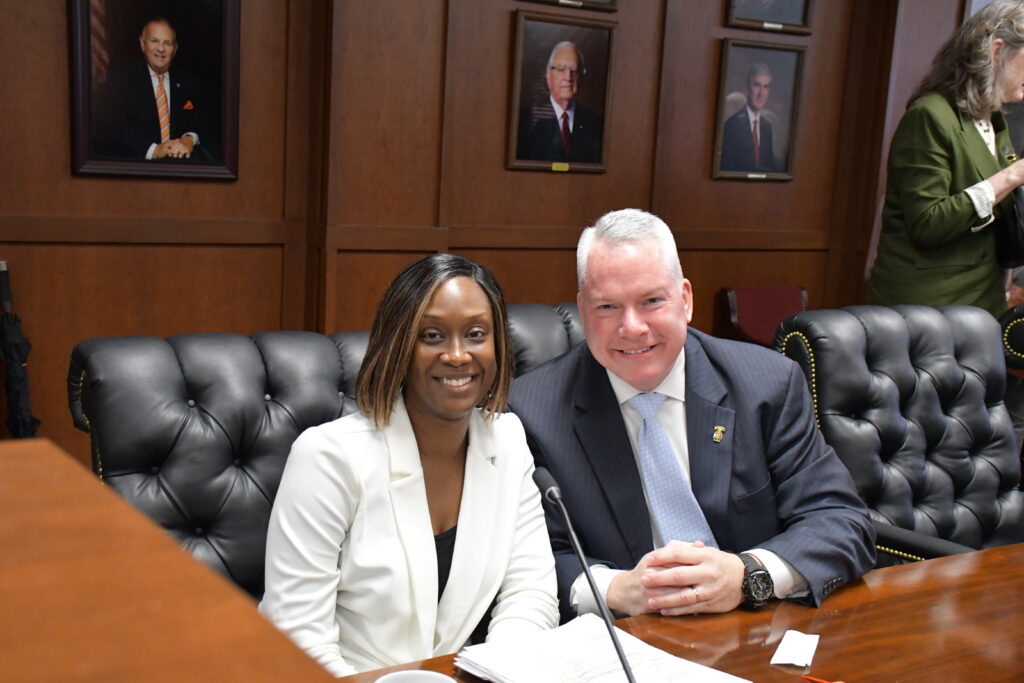
Bradford’s comments were in response to Senate Bill 692, a bill that would change governance within the community college system. If the bill passes, the State Board of Community Colleges would no longer have a student representative after July 1, 2023.
Board member Dr. Grant Campbell asked others to emphasize the importance of student voices on the Board as legislators continue their deliberations on SB 692 in the coming weeks.
“Without the incalculable value of students having input, that we (the Board) can make assumptions,” Campbell said. Campbell went on to say that if the decisions made didn’t turn out how they had hoped, despite good intentions and best efforts, it could be because the Board didn’t have everyone in the room to get the input they needed before they made decisions.
As it stands currently, the student representative serves on the Board for one year.
Transitions, new hires, and recognitions
Lorrel Dunn constantly goes above and beyond in her role as coordinator of building services, Brandy Andrews, NCCCS’ vice president and chief financial officer, said.
“Lorrel takes care of this building in a way that predicts what people need before they ever ask,” Andrews continued.
Dunn was recognized at the Board meeting this month for her outstanding service as an employee of the system office.
Presidents, Board members, and system office staff also commended Andrews for her service throughout the years, commenting on her work ethic, integrity, and passion for the mission.
Andrews will begin a new role outside the system office in July.
This month’s meeting marked the last for interim System President, Dr. Bill Carver. Carver assumed the role of interim president last year. Dr. Kim Gold, chief of staff for the NCCCS, will fill the role of interim president until Cox begins in June.
Morgan Francis was approved to serve as interim president at Wilkes Community College until a new president has been chosen. Francis currently serves as the senior vice president of finance and administration at the college.
Among other transitions, several Board members’ terms expire at the end of June, including, Wade Bryan (Bobby) Irwin Jr., Burr Sullivan, and Ann Whitford.
With the exception of Irwin, who has met term limits, all other Board members can be reappointed. The honorable Chaz Beasley and the honorable Ray Russell are also up for reappointment. Both members were appointed to fill a vacant Board seat of exiting Board members whose term had not yet expired.
Several other personnel decisions were approved by the Board during the meeting:
- Betty Silver will serve as the interim vice president of the economic development department.
- Sandra Thompson was approved to serve as the interim assistant vice president of career and college readiness.
- Candice Lynn Faller was approved as the compliance examiner for the office of propriety schools department.
- Jonnell Carpenter was promoted to assistant legal counsel.
- Poonam Aneja’s promotion to executive assistant I for marketing and communications was approved.
Finish Line Grants
The allocation for the Finish Line Grants received approval. Governor Cooper awarded $2,250,000 for the second year of the program. These grants provide funding to colleges to offer emergency financial assistance to eligible students.
A minimum of $1,500,000 of the funds must be used for emergency financial assistance to students. The Board approved the allocation of the $1,500,000, divided among the 58 colleges. Each college is awarded a $20,000 base amount, and the remaining $1,500,000 is allocated to colleges based on the 2022-23 budget FTE and funding based on previous spending rates. Funds from colleges who choose not to participate will be redistributed to participating colleges. You can view the allocation for each college here.
The remaining $750,000 is available for use at the state or college level to support student outreach and marketing, program implementation, and grant administration. According to Board documents, remaining allocations will follow required approval processes.
High school adjunct instructor certificate
The Board approved a new program to the system during their meeting – the high school adjunct instructor certificate.
In response to the critical teacher shortage, particularly in rural parts of the state, Session Law 2021-48 established a new pathway for those seeking to teach high school-level courses. An individual with a related bachelor’s degree or graduate degree is eligible to teach high school courses in core academic subjects, fine and performing arts, and foreign language after they have completed nine credit hours in a program of study leading to a certificate, diploma, or associate degree in teacher preparation.
The new high school adjunct certificate offered by the system is an attempt to provide an additional pathway to those who wish to teach at a North Carolina public high school, in order to meet a critical need in the teacher preparation pipeline.
The State Board of Community Colleges will hold a virtual meeting in June.
Recommended reading
